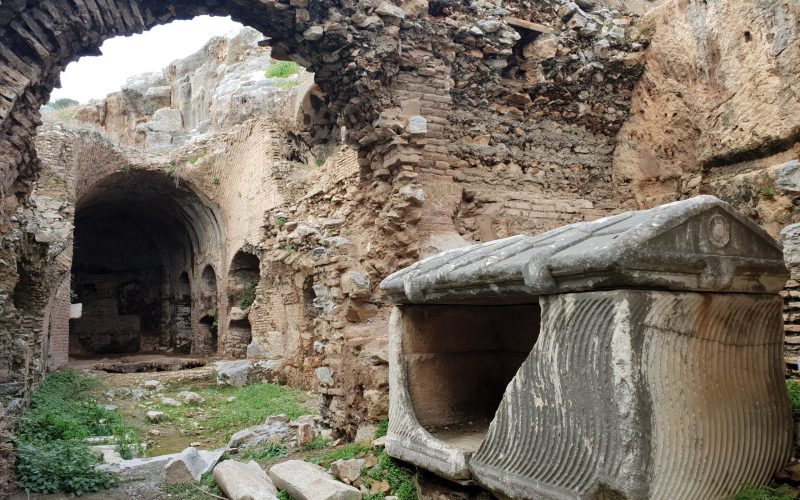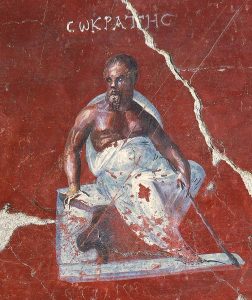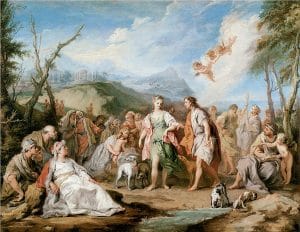Ephesus in Bible – Biblical Ephesus
Today, thousands of people from all over the world, come to this ancient city of Ephesus. They come to the spectacular relics to buy t-shirts for their grandkids and little images of the goddess Artemis who was worshipped 2000 years ago. But, 2000 years ago, people came to Ephesus for a whole different reason from every corner of the globe people came because this was a world-class city. So it’s like New York, Singapore, Paris, or Beijing. It was the center of the cult worship of Artemis.
Pilgrims came to this massive Temple. It was one of the seven wonders of the world. And in the city, there was a group of followers of Jesus Christ. This church planted here thrived during this pagan environment. Headliners like Paul were here for two and a half years, the Apostle John and Timothy. And interestingly enough the letters that Jesus wrote to the churches of Asia Minor, the very first letter He wrote was a letter to this church in the city of Ephesus.
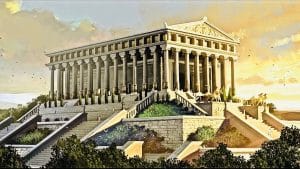
“What you see, writing in a book and send it to the seven churches which are in Asia: to Ephesus, to Smyrna, to Pergamos, to Thyatira, to Sardis, to Philadelphia, and Laodecia.”
Then I turned to see the voice that spoke. And having turned I saw seven golden lampstands and in the seven lampstands One like the Son of Man. “To the angel of the Church of Ephesus write, ‘These things say He who holds the seven stars in His right hand, who walks in the seven golden lampstands: I know your works, your labor, your patience, and that you cannot bear those who are evil.
And you have tested those who say they are apostles and are not, and have found them liars, and you have persevered and have patience, and have labored for My name’s sake and have not become weary. Nevertheless, I have this against you, that you have left your first love.
Remember therefore from where you have fallen; repent and do the first works, or I will come to you quickly and remove your lampstand from its place unless you repent. But this you have, that you hate the deeds of the Nicolaitans, which I also hate. He who has an ear, let him hear what the Spirit says to the churches. To him who overcomes I will give to eat from the tree of life, which is in the midst of the paradise of God.”
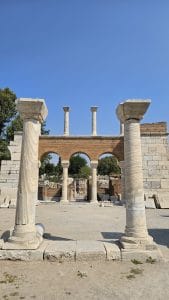
They are the kinds of spectacular ruins that tourists come from all over the world to see. But for early Christians walking through this Plaza, this was the library. One of the greatest libraries in the world, reminding them that they were in an intellectual center. As they walk through the archways on the right side of the library they see over the top the inscription, to Caesar Augustus who is God.
And it would remind them of the worship of the emperors that created so much tension in their lives. Just opposite the library, is the town brothel written out in the public, which would again remind them of the seduction of the rampant sexual immorality in Ephesus. But through those arches is where the action happened. The town market, The Agora.
The Agora was the most important trade center in Ephesus. It was in the town of a large square, surrounded by columns with three gates. I’ve entered through the gate from the Celsus library. Three sides of the agora were surrounded by a portico that held the shops doing business in this commercial center. Ephesus was a port city and goods from all over the known world were sold right here in this place.
No city tells us what life was like for early Christians in the Roman Empire like the City of Ephesus. Ephesus was affluent. It sat on the edge of a major seaport. So trade from literally all over the known world parked its ships in the Seaport and filled the city with goods that were much coveted by people who came from land routes. Trade routes on land ended up here in Ephesus. So Ephesus was a rich town. And was very cosmopolitan, people from all over the world lived here.
Jews and Gentiles and Persians and most of the significant activity took place right here in the Agora or the marketplace. The agora would have been filled with the fragrant aromas of spices from far and distant lands with the beautiful colors of textiles that had been woven and brought here for sale. People would gather here socially. I mean this was like a mall on steroids.
This was the center of life in Ephesus and the center of life in most cities in the Roman Empire. And so what would happen here would be largely determinative of the social interactions and status of early Christians. Of course, one challenge was that at the entrance to the Agora was an incense burner.
To enter the agora on good terms, you had to take a little incense as an act of loyalty to the Emperor who claimed to be Lord and drop it in the incense burners. Christians struggled with that. It was tough to navigate that, to be shut out of the agora meant to be shut out of so much of life. But that was the challenge for them.
Another unsettling reality for early Christians was the presence of demons and demons’ activity. Oracles were priests to the gods and goddesses. They spoke for the gods and goddesses. Here is the Ephesus, they dwelt in the temple. Oracles would do miraculous wonders all driven by the underworld. So when Paul wrote to Ephesus in Ephesians, chapter six; “Put on the full armor of God for we wrestle not against flesh and blood but principalities and powers, against the rulers of darkness in high places.” They know what he meant and They took him seriously.
Paul was asking them; not the just stand against the government or for a cause that judges others read this letter to Ephesus sometime. He calls them to live a life in this community. That says something that rings true in all of our hearts. Things like; forgiving your enemies, showing love and compassion to all, honoring your father and mother, bringing your children up in the admonition of the Lord, and bound servants be obedient to those who are your masters, masters if got a give up threatening, no one you to have a master in heaven.
Paul admonishes them for sincerity and goodwill in a community that worshipped God who said nothing like this. In short, he was asking them to be like Christ in the Christ denying the world.
Just outside, the gate leading to the temple of magnesia is the city dump standing in sharp contrast to the bustling opulence and marble-clad glitter of the city of Ephesus is this quiet, very sad place… sad because here among these littered relics of the past was a place where citizens of Ephesus would come and discard their unwanted babies on the top of the trash heap.
The Roman law of death by exposure permitted the citizens of the empire to throw their unwanted babies away in places like this and then expose them to the heat, the dehydrating infants would soon pass out of this life and it was into the sad stench of a dump like this that Christians grabbed an Opportunity. History tells us that early Christians came out here and harvested these babies. Took them back into their homes and reared them.
I’m wondering if you had discarded one of your babies perhaps walking down the street in Ephesus you would see a follower of Jesus with three or four little children around them and if you would wonder if one of them was yours.
Needless to say, this behavior of the early church caught the attention of the Roman Empire and made people think. These people are different in a very compelling way. Under the cover of the Roman Rule of death by exposure, Soranus of Ephesus, a world-famous gynaecologist, wrote a manual for midwives and in that manual, he described how they should measure the limbs and the bodies and the proportions of newborn babies to see if whether or not this baby was worth rearing.
If the baby didn’t pass the muster, then the family would bring the baby here to this dump. Perhaps the baby was deformed. Perhaps the baby was a girl or perhaps the baby was inconvenient whatever the case death by exposure permitted them to unload their children to the steaming sun of these hillsides.
Why would anybody want to do this? It’s really hard to imagine, isn’t it? But given the reality that the temple of Artemis was full of hundreds of temple prostitutes, unwanted births were a daily event. So often these prostitutes would bring their babies out here and leave them to die.
There was another reason. That was because the equestrian class, the highest level of privileged citizens in Ephesus who were purple in the streets, who had all the best seats in a theatre and at the games, to maintain your status in that upper-level class you had to have a certain amount of money in your portfolio. That was measured periodically.
If you lost some money, you would be eliminated from the privileged part of society. Too many children would often drain your resources so, to maintain your place in the equestrian class to be a person of purple, you might want not to have too many children, and death by exposure permitted you to maintain your status.
The interesting and important question is why would Christians come out here to rescue these babies from the town dump? Well, the answer is found in the fact that according to the book acts that Christians in Ephesus were called people of the way.
They were followers of Jesus, the one who came and said “I am the way.” I’m the way to live and in the life of Jesus, they had learned early on the value of children and the value of life. In the world that detained children and pushed them away, it was Jesus who said, “Permit the little children to come unto me.” He also warned that if you abuse even one of these little ones, it would be better than a millstone around your neck and the value of life He said that He was living and had come to give us life.
So the early Christians seeing this brutal waste of infants were compelled by Jesus. They were followers of him. They would be like him in their world and that is why they came to take these babies into their homes it was that difference in their lives that caught the attention of a watching world that in essence became the neighborhood chatter about these Christians doing these things and are what opened the door of people’s hearts for others to hear about Jesus who was truly the way.

